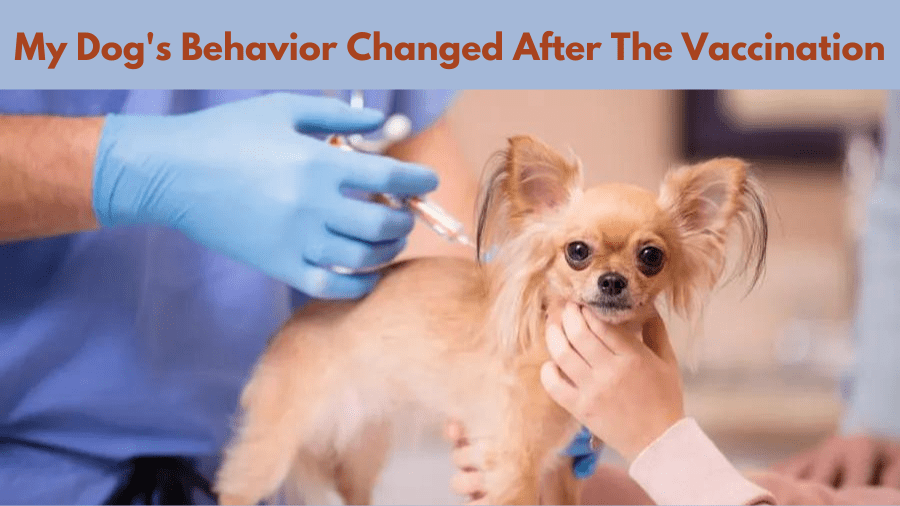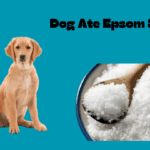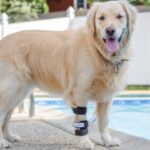Vaccinating your dog is one of the best ways to protect them from various diseases and ensure their health and happiness. However, some dog owners may have concerns about how their dogs will react to the vaccination and what to do if they notice any symptoms.
It’s not uncommon for dog owners to observe changes in their pet’s behavior following a My dog’s behavior changed after the vaccination.
In this article, we will talk about dog vaccination reactions and provide some tips on how to comfort your dog after a vaccination.
Contents
- 1 My dog’s behavior changed after the vaccination how will it act after vaccination?
- 2 How Should a Dog Be Comforted Following a Vaccination?
- 3 What Is the Most Common Vaccine Reaction in Dogs?
- 4 Can Dogs Have Bad Reactions to Vaccines?
- 5 How Come My Dog Is Behaving Strangely After Getting Shots?
- 6 What Is the Normal Behavior of a Puppy After Shots?
- 7 Expected Responses from Puppies
- 8 Monitoring Puppy Behavior Post-Vaccination
- 9 Conclusion
My dog’s behavior changed after the vaccination how will it act after vaccination?
It is normal for your dog to experience some changes in their behavior and physical condition after receiving a vaccination. These changes are usually mild and temporary, and they indicate that your dog’s immune system is responding to the vaccine.
Immediate Behavior Changes
Some of the immediate behavior changes that you may notice in your dog after vaccination include:
Lethargy: Your dog can appear more lethargic or less energetic than normal.. They may prefer to rest or sleep more than play or exercise.
Loss of appetite: Your dog may have less interest in food or water. They may eat or drink less than normal or skip a meal altogether.
Soreness: Your dog may feel some pain or discomfort at the injection site. They may lick or scratch the area or avoid being touched there.
These behavior changes are usually not a cause for concern, and they should subside within 24 hours. However, if they persist for longer or worsen over time, you should contact your veterinarian.
Potential Symptoms to Watch for
In addition to the behavior changes mentioned above, some dogs may develop more noticeable symptoms after vaccination. These symptoms may include:
Fever: Your dog may have a higher body temperature than normal. You can check your dog’s temperature by using a rectal thermometer or feeling their ears or nose. A normal temperature for dogs is between 99.5°F and 102.5°F. If your dog’s temperature is above 103°F, they may have a fever.
Swelling: Your dog may have some swelling or inflammation at the injection site or in other parts of their body. The swelling may appear as a lump, a bump, or a red area on the skin. It may also affect your dog’s face, eyes, or throat, making them look puffy or swollen.
Hives: Your dog may develop an allergic reaction to the vaccine, which may manifest as hives or welts on the skin. Hives are raised, itchy, red patches that may vary in size and shape. They may appear anywhere on your dog’s body, but they are more common on the head, neck, and chest.
These symptoms are more serious than behavior changes, and they may indicate that your dog is having an adverse reaction to the vaccine. You should monitor your dog closely and seek veterinary attention if the symptoms do not improve or worsen within a few hours.
Duration of Symptoms
The duration of the symptoms that your dog may experience after vaccination depends on several factors, such as the type of vaccine, the dose, the frequency, and your dog’s response. Generally, most symptoms should resolve within one to three days, but some may last longer or recur periodically.
Some vaccines, such as the rabies vaccine, may cause more prolonged or delayed reactions than others. For example, some dogs may develop a condition called rabies vaccine granuloma, which is a hard lump that forms at the injection site and may persist for weeks or months. This condition is not harmful, but it may be uncomfortable or unsightly for your dog.
Other vaccines, such as the Bordetella vaccine, may cause more frequent or recurrent reactions than others. For example, some dogs may develop a mild cough or sneeze after receiving the Bordetella vaccine, which is intended to prevent kennel cough. This is not a sign of infection, but rather a normal immune response that may last for a few days or weeks.
How Should a Dog Be Comforted Following a Vaccination?
There are some simple steps that you can take to comfort your dog after a vaccination and help them recover faster. These include:
Creating a Calm Environment
Your dog may be more sensitive or irritable after a vaccination, so it is important to create a calm and quiet environment for them. You can do this by:
- Reducing noise and distractions in your home. Avoid loud music, TV, or visitors that may stress your dog.
- providing a warm, inviting space for your dog to relax.
- You can use a crate, a bed, a blanket, or a pillow to make your dog feel safe and secure.
- Keeping your dog away from other pets or children that may bother them. Your dog may not want to play or interact with others, and they may react defensively if provoked.
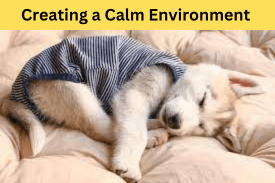
Providing Comfort Measures
Your dog may appreciate some extra attention and care after a vaccination, as long as they are not too sore or uncomfortable. You can do this by:
- Give your dog some gentle petting or massage. You can stroke your dog’s fur, rub their ears, or massage their muscles to help them relax and ease any pain. However, avoid touching the injection site or any swollen areas, as this may cause more discomfort or irritation.
- Offering your dog some treats or toys. You can give your dog some of their favorite snacks or toys to reward them for being brave and distract them from any symptoms. However, do not force your dog to eat or play if they are not interested, as this may cause more stress or nausea.
- Keeping your dog hydrated. You can provide your dog with fresh and clean water to help them stay hydrated and flush out any toxins. However, do not overdo it, as too much water may cause vomiting or diarrhea.
Monitoring for Any Adverse Reactions
While most dogs will recover from a vaccination without any complications, some dogs may develop more severe or life-threatening reactions that require immediate medical attention. You should monitor your dog closely for any signs of an adverse reaction, such as:
- Difficulty breathing or swallowing. Your dog may have a severe allergic reaction called anaphylaxis, which may cause their airways to swell and close. This is a medical emergency that can be fatal if not treated quickly.
- Seizures or tremors. Your dog may have a neurological reaction to the vaccine, which may affect their brain or nervous system. This may cause them to lose consciousness, convulse, or twitch uncontrollably.
- Vomiting or diarrhea. Your dog may have a gastrointestinal reaction to the vaccine, which may affect their stomach or intestines. This may cause them to expel the contents of their digestive tract, which may lead to dehydration or electrolyte imbalance.
- Collapse or shock. Your dog may have a cardiovascular reaction to the vaccine, which may affect their heart or blood pressure. This may cause them to lose blood flow to their vital organs, which may result in organ failure or death.
If you notice any of these signs in your dog, you should call your veterinarian immediately or take your dog to the nearest emergency clinic. Do not wait or try to treat your dog at home, as this may worsen their condition or delay their treatment.
Suggested: Why Does My Puppy Sit On My Other Dog’s Head?
My Dog Was Attacked And Now Won’t Eat
What Is the Most Common Vaccine Reaction in Dogs?
The most common vaccine reaction in dogs is a mild local reaction at the injection site. This may include:
Redness or swelling. Your dog may have some inflammation or irritation at the injection site, which may make the area look red or swollen. This is usually not painful, but it may cause some discomfort or itching for your dog.
Warmth or hardness. Your dog may have some increased blood flow or tissue damage at the injection site, which may make the area feel warm or hard to the touch. This is usually not harmful, but it may indicate that your dog’s immune system is working hard to fight the vaccine.
Abscess or infection. Your dog may have some bacterial contamination or foreign body reaction at the injection site, which may cause the area to fill with pus or fluid. This is usually rare, but it may require antibiotics or drainage to treat.
These local reactions are usually mild and self-limiting, meaning that they will resolve on their own without any treatment. However, if they persist for more than a week or worsen over time, you should consult your veterinarian.
Can Dogs Have Bad Reactions to Vaccines?
Vaccines are essential for protecting your dog from various diseases and infections. However, some dogs may experience adverse reactions to vaccines, ranging from mild to severe.
In this article, we will discuss how to recognize and handle these reactions, as well as why your dog may act weird or different after getting shots.
Understanding Adverse Reactions
An adverse reaction is an unwanted or unexpected response to a vaccine. It can occur immediately after the injection, or within hours or days later. Adverse reactions can be caused by several factors, such as the type of vaccine, the dose, the dog’s age, health, and breed, or the presence of other medications or allergies.
Mild Reaction
Most adverse reactions are mild and transient, meaning they resolve on their own without any serious consequences. Some examples of mild reactions are:
Soreness or swelling at the injection site
Fever
Lethargy
Loss of appetite
Vomiting or diarrhea
These symptoms usually subside within 24 to 48 hours and do not require any specific treatment. However, you should monitor your dog closely and provide plenty of water and rest. You can also apply a cold compress to the injection site to reduce inflammation and pain.
Identifying Severe Reactions
In rare cases, some dogs may develop severe or life-threatening reactions to vaccines. These are known as **anaphylactic reactions**, and they involve a systemic allergic response that affects multiple organs and systems. Some signs of an anaphylactic reaction are:
Difficulty breathing
Hivesor rash
Pale gums
Collapse or seizures
An anaphylactic reaction is a medical emergency that requires immediate veterinary attention. If you notice any of these signs in your dog, do not hesitate to call your vet or take your dog to the nearest animal hospital. Your dog may need to receive antihistamines, steroids, fluids, oxygen, or other medications to stabilize their condition and prevent further complications.
Seeking Veterinary Assistance
If you are unsure whether your dog’s reaction is mild or severe, or if you have any questions or concerns about your dog’s health after vaccination, you should always consult your veterinarian.
Your vet can examine your dog, perform any necessary tests, and prescribe any appropriate treatments. Your vet can also advise you on how to prevent or minimize future reactions, such as by adjusting the vaccine schedule, type, or dose, or by pre-medicating your dog with antihistamines or anti-inflammatories.
How Come My Dog Is Behaving Strangely After Getting Shots?
Following vaccination, some dog owners may discover that their pets behave oddly or differently. This may be the result of several factors, including:
Stress: Getting vaccinated can be a stressful experience for some dogs, especially if they are not used to visiting the vet, being handled by strangers, or being around other animals. Stress can cause your dog to become anxious, nervous, or agitated, or to display signs of fear, aggression, or submission. To help your dog cope with stress, you should provide a calm and comfortable environment, avoid any unnecessary stimuli or changes, and reward your dog with praise, treats, or toys.
Pain: As mentioned earlier, some vaccines can cause soreness or swelling at the injection site, which can make your dog feel uncomfortable or painful. Pain can affect your dog’s mood, energy, and appetite, and make them more irritable, restless, or withdrawn. To ease your dog’s pain, you can follow the tips mentioned in the previous section, such as applying a cold compress, providing water and rest, and consulting your vet if needed.
Side effects: Some vaccines can cause temporary side effects that may alter your dog’s behavior, such as fever, lethargy, loss of appetite, vomiting, or diarrhea. These side effects usually last for a short period and do not indicate any serious problems. However, they can make your dog feel unwell, weak, or nauseous, and affect their normal activities and routines. To help your dog recover from these side effects, you should monitor your dog closely, provide plenty of water and bland food, and consult your vet if the symptoms persist or worsen.
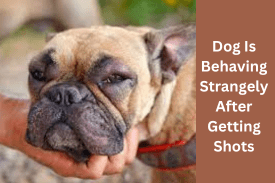
Addressing Concerns about Strange Behavior
If you notice that your dog is acting weird after getting shots, you should not panic or overreact. Most likely, your dog is just experiencing some minor discomfort or stress and will return to their normal self soon.
However, you should also not ignore or dismiss your dog’s behavior, as it may indicate a more serious issue or reaction. You should always pay attention to your dog’s signs and symptoms, and seek veterinary assistance if needed.
Some tips to address your concerns about your dog’s strange behavior are:
Keep a record: It can be helpful to keep a record of your dog’s vaccination history, including the date, type, and dose of each vaccine, as well as any reactions or side effects that occurred. This can help you track your dog’s response to each vaccine, and identify any patterns or trends. You can also share this information with your vet, who can use it to adjust your dog’s vaccination plan or protocol.
Contact your vet: If you have any questions or doubts about your dog’s behavior after vaccination, you should always contact your vet for advice. Your vet can answer your queries, address your worries, and provide you with guidance and support. Your vet can also tell you when to bring your dog in for a check-up or follow-up, or when to seek emergency care.
Trust your instincts: As a dog owner, you know your dog best. You can recognize when your dog is acting normal or abnormal, and when something is wrong or off. If you feel that your dog’s behavior is unusual or concerning, or if you notice any signs of distress or danger, you should trust your instincts and act accordingly. Do not hesitate to call your vet or take your dog to the vet if you think they need help.
What Is the Normal Behavior of a Puppy After Shots?
Puppies are more vulnerable to diseases and infections than adult dogs, which is why they need to receive a series of vaccines during their first year of life.
However, puppies may also react differently to vaccines than older dogs, as their immune systems are still developing and maturing.
In this section, we will discuss what is the normal behavior of a puppy after shots, and how to care for your puppy post-vaccination.
Expected Responses from Puppies
Puppies may exhibit some of the same responses as adult dogs after vaccination, such as soreness, swelling, fever, lethargy, loss of appetite, vomiting, or diarrhea.
These are normal responses, and they indicate that your puppy’s immune system is working and responding to the vaccine. However, these responses may be more pronounced or prolonged in puppies, as their bodies are smaller and more sensitive to the vaccine.
Puppies may also show some unique responses after vaccination, such as:
Sleepiness: Puppies may sleep more than usual after getting shots, as their bodies are using energy to fight off the vaccine and produce antibodies. This is normal and beneficial, as sleep helps your puppy heal and recover. However, you should make sure that your puppy is not too sleepy or unresponsive, and that they wake up for food, water, and bathroom breaks.
Clinginess: Puppies may become more clingy or needy after getting shots, as they may feel scared, insecure, or uncomfortable. They may seek your attention, comfort, or protection, and follow you around or cuddle with you more than usual. This is normal and understandable, as you are your puppy’s source of safety and love. However, you should also make sure that your puppy is not too dependent or anxious, and that they can cope with being alone or separated from you for short
Playfulness: Puppies may become more playful or energetic after getting shots, as they may feel relieved, happy, or excited. They may want to play, run, or explore more than usual, and show signs of curiosity, enthusiasm, or joy. This is normal and desirable, as it shows that your puppy is healthy, confident, and social. However, you should also make sure that your puppy is not too hyperactive or reckless, and that they do not overexert themselves or injure themselves.
Monitoring Puppy Behavior Post-Vaccination
As a puppy owner, you should monitor your puppy’s behavior closely after vaccination, and look for any changes or abnormalities.
You should observe your puppy’s physical and mental state, and check for any signs of discomfort, distress, or danger. You should also provide your puppy with proper care and support, and help them adjust to their new situation.
Some tips to monitor and care for your puppy after vaccination are:
Provide a safe and comfortable space: You should provide your puppy with a safe and comfortable space where they can rest, relax, and recover after vaccination. You should make sure that the space is clean, quiet, and cozy, and that it has everything your puppy needs, such as a bed, a blanket, a toy, a bowl of water, and a litter box or a pad. You should also keep your puppy away from any potential hazards, such as stairs, sharp objects, or other animals.
Limit your puppy’s activity: You should limit your puppy’s activity level and intensity after vaccination, and avoid any strenuous or stressful activities, such as long walks, rough play, or training. You should let your puppy set their own pace follow their cues, and not force them to do anything they do not want to do. You should also avoid exposing your puppy
Conclusion
Vaccination is a vital part of your dog’s health care, as it protects them from various diseases and infections. However, vaccination can also cause some reactions in your dog, which can range from mild to severe.
Many pet owners worried about and asked about My dog’s behavior changed after the vaccination, a responsible dog owner, should understand the possible reactions that your dog may have after getting shots, and how to recognize and handle them
. You should also monitor your dog’s behavior closely after vaccination, and look for any changes or abnormalities. You should provide your dog with proper care and support, and help them adjust to their new situation.
You should also consult your veterinarian if you have any questions or concerns about your dog’s health after vaccination, or if you notice any signs of distress or danger. By doing so, you can ensure your dog’s well-being and happiness after vaccination, and enjoy a long and healthy life together.

